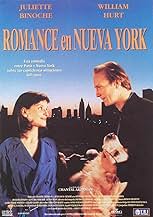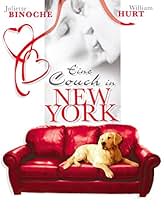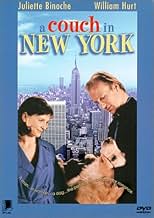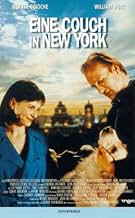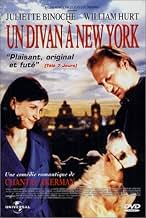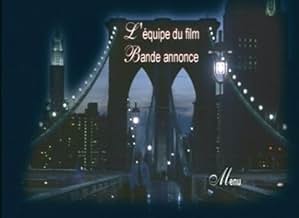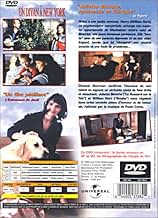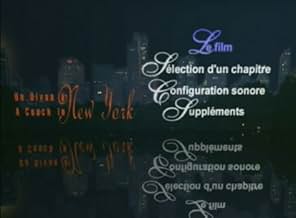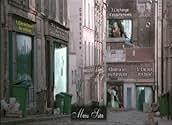Un divan à New York
- 1996
- Tous publics
- 1h 48m
IMDb RATING
5.9/10
2.5K
YOUR RATING
A psychoanalyst in NYC exchanges apartments with a woman in Paris. When his patients show up, they talk to her and then pay. He returns early to NYC and becomes a patient.A psychoanalyst in NYC exchanges apartments with a woman in Paris. When his patients show up, they talk to her and then pay. He returns early to NYC and becomes a patient.A psychoanalyst in NYC exchanges apartments with a woman in Paris. When his patients show up, they talk to her and then pay. He returns early to NYC and becomes a patient.
- Awards
- 1 win & 1 nomination total
Boris Lyoskin
- Cab Driver #1
- (as Boris Leskin)
Tiffany Fraser
- Julie
- (as Tiffany Frazer)
Featured reviews
In Couch in New York, the first American film by acclaimed Belgian director Chantal Akerman, Dr. Henry Harriston (William Hurt) is a dour New York psychoanalyst who is close to exhaustion. He decides to place an ad in the Paris Herald Tribune offering to swap his New York apartment for a month. Henry ends up in the digs of a free-spirited dancer from Paris, Beatrice Saulnier (Juliet Binoche) and she takes over his swank New York penthouse. Obviously well to do, Henry's apartment is spacious, impeccably furnished, and meticulously cared for, while hers is messy, bohemian, and funky.
In what Ms. Akerman describes as "what Hollywood calls a double fish out of water film", this film is something of a curiosity yet it's one of the best screwball romantic comedies I've seen. The premise is totally ludicrous of course and off the wall but that's what makes it so special. Of course, I'm particularly open to films that pop the bubble of the psychiatric establishment.
Apparently Henry forgets to tell his patients he is going away and they come knocking on Ms. Saulnier's door and calling for appointments, hardly even noticing the change in doctors. Being a sweet and sympathetic soul and not wanting to turn people away, she listens to their stories for an hour and they pay her money for her advice (illegally of course). She learns quickly that all analysts have to say is "yeees" or "hmmmm" or "what comes to mind now?" and get paid big bucks. Of course, patients have the right to remain silent and sometimes nothing comes to mind (they can sometimes spend an hour in total silence and must still pay for the privilege). Ms. Saulnier is an understanding person and a good listener and, in quite a slap at the "professionals", achieves more success with Henry's patients (not to mention his dog Edgar) in one week than he apparently has in years.
Beatrice decides to continue to pretend to be Dr. Harriston's assistant and studies up on her Freud. Meanwhile in Paris, Henry must contend with Beatrice's aggressive boy friends, messy rooms, leaky plumbing and the hammering of a roof being repaired. Fed up with the problems in Paris, he returns to New York to stay with an old friend in a down home part of Brooklyn. Conveniently for the plot, the good doctor stops off at his office and finds Beatrice playing psychoanalyst and his patients miraculously improved. Finding Ms. Saulnier intriguing and attractive, he goes along with her game, pretending to be her patient. This sets off a process of mutual discovery and self-awareness that is quite predictable but nonetheless amusing and enlightening.
This was my first Akerman film and while I realize it is totally unlike her others, I really loved it and found both leads to be superb. Binoche never looked more alluring and Hurt is terrific in his role as the deadpan doctor. I don't know who's crazy, the majority of critics who trashed it or me, but I know for sure one of us is ready for the couch. I won't say any more about Couch in New York except that while it does unfold its magic at a very leisurely pace, the rewards are there for the patient (no pun intended). Since the ending left me with such a warm, fuzzy feeling, I'm thinking of calling Ms. Binoche and.well.on second thought.
In what Ms. Akerman describes as "what Hollywood calls a double fish out of water film", this film is something of a curiosity yet it's one of the best screwball romantic comedies I've seen. The premise is totally ludicrous of course and off the wall but that's what makes it so special. Of course, I'm particularly open to films that pop the bubble of the psychiatric establishment.
Apparently Henry forgets to tell his patients he is going away and they come knocking on Ms. Saulnier's door and calling for appointments, hardly even noticing the change in doctors. Being a sweet and sympathetic soul and not wanting to turn people away, she listens to their stories for an hour and they pay her money for her advice (illegally of course). She learns quickly that all analysts have to say is "yeees" or "hmmmm" or "what comes to mind now?" and get paid big bucks. Of course, patients have the right to remain silent and sometimes nothing comes to mind (they can sometimes spend an hour in total silence and must still pay for the privilege). Ms. Saulnier is an understanding person and a good listener and, in quite a slap at the "professionals", achieves more success with Henry's patients (not to mention his dog Edgar) in one week than he apparently has in years.
Beatrice decides to continue to pretend to be Dr. Harriston's assistant and studies up on her Freud. Meanwhile in Paris, Henry must contend with Beatrice's aggressive boy friends, messy rooms, leaky plumbing and the hammering of a roof being repaired. Fed up with the problems in Paris, he returns to New York to stay with an old friend in a down home part of Brooklyn. Conveniently for the plot, the good doctor stops off at his office and finds Beatrice playing psychoanalyst and his patients miraculously improved. Finding Ms. Saulnier intriguing and attractive, he goes along with her game, pretending to be her patient. This sets off a process of mutual discovery and self-awareness that is quite predictable but nonetheless amusing and enlightening.
This was my first Akerman film and while I realize it is totally unlike her others, I really loved it and found both leads to be superb. Binoche never looked more alluring and Hurt is terrific in his role as the deadpan doctor. I don't know who's crazy, the majority of critics who trashed it or me, but I know for sure one of us is ready for the couch. I won't say any more about Couch in New York except that while it does unfold its magic at a very leisurely pace, the rewards are there for the patient (no pun intended). Since the ending left me with such a warm, fuzzy feeling, I'm thinking of calling Ms. Binoche and.well.on second thought.
I really tried hard to like it... but the film simply is boring. In spite of a charming Binoche and a promising story, Akerman fails to create any true atmosphere. She manages to create some funny scenes, but a couple of funny scenes do not make a comedy. Neither does the viewer care about Hurt and his psychoanalyst nor do we feel any warmth and human feelings in his beginning relationship with Binoche. No romantic sparks flying, at least I didn't see any. The dialogue is also not funny. This is the second film by Akerman I viewed, the other being The Captive, which also fails for the same reasons. Akerman may have delivered nuanced portraits of persons, especially women, in earlier films, but Un divan in New York lacks everything a comedy needs.
This mess needed a Lubitsch touch if it was ever going to succeed, and Akerman is no Lubitsch. Bad script, poor acting (although it is amusing to hear Hurt's French--what is behind this trend for American actors in French roles?; cf Malkovich in Temps Retrouve). When the best scene is a dog swimming in Central Park lake, you've got trouble.
A Couch in New York is a French/American/Belgium co-production with the innocence and humour of the romantic comedies of the 50's. Juliet Binoche shows the charm of a modern day Audrey Hepburn (with the same beautiful vulnerability portrayed by Hepburn in Funny Face and Breakfast at Tiffany's) while William Hurt plays the strong man role that used to be reserved for the likes of Humphrey Bogart, Fred Astaire or Gregory Peck. Using old tricks of mistaken identity and falling in love with a stranger, the dialogue is somehow saved from sounding corny and instead pays homage to the classic romantic comedies. A two tissue movie.
I think the first minutes and the end are great moments of comedy. Nevertheless if I were the director I would have explored more the situation of the characters, he in Paris, she in New York, with a lot of gags, to put them together only in the end. His sudden return to New York slows the funny rythm of the beginning in my opinion and puts us into a series of pseudo romantic very weak scenes like those sessions with Hurt on the couch and Binoche uttering monosyllabes all the time. And one "intelligent" question: how could she got the dog into the plane right in the hour in spite of all those very strict rules about animals travelling abroad?
Did you know
- TriviaChantal Akerman has since criticized her actors, William Hurt and Juliette Binoche, for not helping her promote the movie, after early mixed reception and production problems. Akerman has since said that both actors were difficult to work with and that Binoche was "as cold as an ice cube".
- Quotes
Beatrice Saulnier: Freud and all this stuff, it's very enlightening, huh?
- How long is A Couch in New York?Powered by Alexa
Details
- Release date
- Countries of origin
- Official site
- Languages
- Also known as
- A Couch in New York
- Filming locations
- Babelsberg, Potsdam, Brandenburg, Germany(Studio, interiors)
- Production companies
- See more company credits at IMDbPro
Box office
- Gross worldwide
- $1,513
- Runtime
- 1h 48m(108 min)
- Color
- Sound mix
- Aspect ratio
- 1.85 : 1
Contribute to this page
Suggest an edit or add missing content


